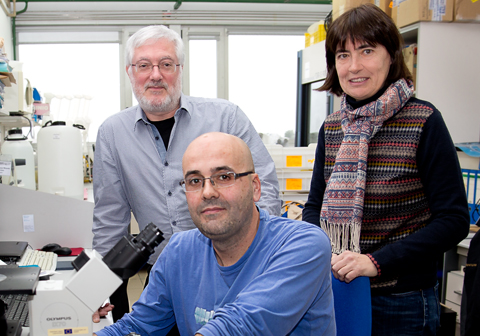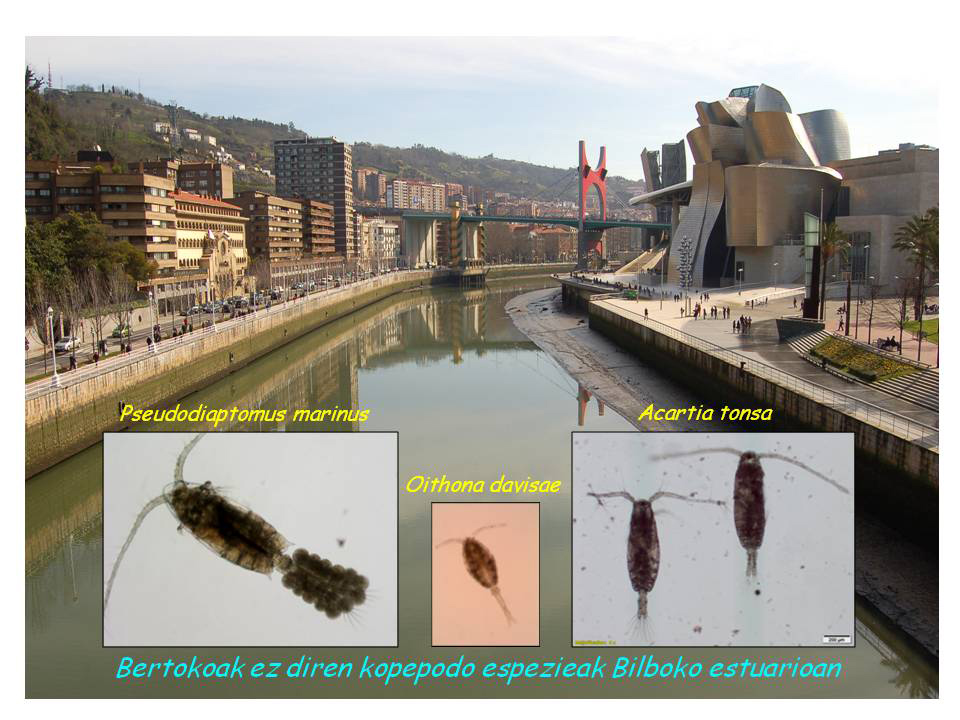Since the water quality in the Bilbao estuary began to improve in the 1980s, the habitat has been improving and filling with species. A UPV/EHU research group has for the last 20 years been observing the colonisation by zooplankton in this environment. Over the last ten years several species of Indo-Pacific origin, which in other habitats are invasive species, have become dominant. However, as they have moved into an unoccupied environment, the researchers have highlighted the benefits they bring by increasing biodiversity.
It is non-native species that are increasing biodiversity in the estuary of Bilbao
For the last 20 years researchers at the UPV/EHU-University of the Basque Country have been monitoring the colonisation of the estuary of Bilbao by zooplankton species
- Research
First publication date: 12/01/2017

The zooplankton ecology group of the UPV/EHU's Department of Plant Biology and Ecology began studying the estuary of Bilbao back in 1997. "Bilbao was right in the midst of a recovery and transformation process so we had the chance to see how the estuary was recovering," explained the researcher Ibon Uriarte. Through monthly sample gathering they have been witnessing the changes that have been taking place in the estuary. Firstly they examine the abiotic variables, mainly the oxygen, and, then the zooplankton.
Uriate described the situation thus: "Nowadays, the estuary of Bilbao can be said to be in a pretty good state, at least in terms of the level of oxygen, indispensable for living organisms. There is undoubtedly room for improvement and that it will never resemble the ecosystem it once was owing to its high degree of transformation. But the lack of oxygen that predominated in the 1980s is now relegated to the bottom of the innermost zone of the estuary. In fact, the riverbeds and sediments of the water masses are the most difficult to restore, because the discharges endured over years have built up there".
As the sine qua nons gradually improved, "the brackish habitats that were initially unoccupied began to fill with zooplankton species," pointed out the researcher. The first ones on the scene were species of marine origin, but they were opportunistic ones, in other words, capable of adapting to these conditions. After that, species belonging to estuaries arrived and replaced the previous ones. What is unusual, however, is that "they are not native species but alien, invasive ones," he added.
Both the native and non-native ones increase the biodiversity
Biological invasions tend to be one of the main causes of the loss of biodiversity and pressure brought to bear on ecosystems. Yet in the case of the estuary of Bilbao, Uriarte makes a different assessment: "The non-native species have ended up in a habitat that was previously unoccupied. Therefore, we cannot speak of the shift of native species; all they have done is increase the diversity. And that could lead to the formation of new communities with new functions in the ecosystem".
The first two non-native species appeared in 2001: Oithona davisae and Acartia tonsa. They are of Indo-Pacific, warm-water origin, although over the last few decades they have been spreading across coastal and estuarine areas all over the world, as a result of anthropic introduction and their own propagation. "In Bilbao, these two species not only turned up, they also became consolidated and even turned into the dominant species in 2003-2004, years in which the summer periods were particularly warm," explained the researcher.
In 2010 they spotted the appearance of a third non-native species, Pseudodiaptomus marinus, a copepod from brackish, warm waters originating in the Pacific. "So far it can be found in very small densities, so it is still very early to determine whether it will settle in the estuary of Bilbao or whether it is a sporadic appearance," he said.
From now on "we are aiming to determine the impact of the non-native species on the estuary of Bilbao on an ecosystem level," pointed out Uriarte. The improvement in the environmental conditions of the estuary of Bilbao has, in fact, allowed colonisation by various species of zooplankton to take place, "but in the same way, hydro-climatic events and human action have exerted a great influence in terms of the introduction of non-native species, among others".
Photos: Ibon Uriarte. UPV/EHU.
Bibliographic reference
- Insights on the origin of invasive copepods colonizing Basque estuaries; a DNA barcoding approach
- Marine Biodiversity Records
- DOI: 10.1186/s41200-016-0045-2








